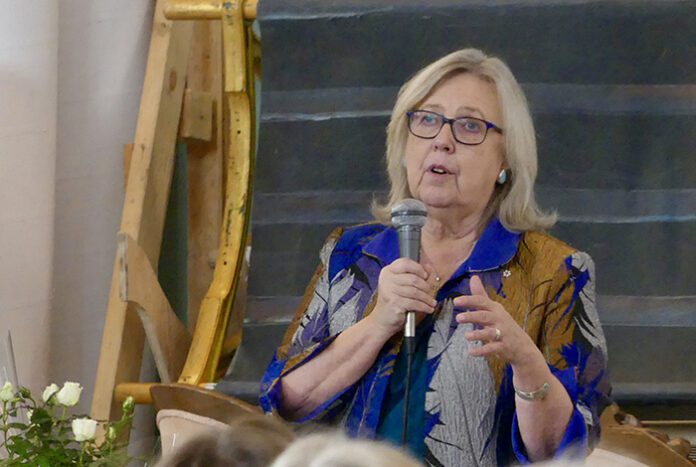There’s no inevitability in a democracy, according to one elected official –– and the greatest power remains rooted in each vote.
Responding to questions at a Salt Spring Island town hall event, Saanich-Gulf Islands MP and Green Party leader Elizabeth May warned widespread framing of gains by Conservatives in the upcoming election as “preordained” risks suppressing voter turnout.
“The media is not helping us here,” said May. “They are creating the impression of a Conservative win as inevitable, like it’s all done already.”
The comments came during the first of a series of planned nonpartisan meetings with her constituents held Saturday, Jan. 11 at the Gulf Islands Secondary School. More than 100 islanders turned out to ask questions and visit with the popular MP, who won her party’s first federal seat in 2011.
The impact of telling voters an election is already decided is that it encourages people to stay home on voting day, May cautioned, citing examples like the 2022 provincial election in Ontario. During what she called a “steady drumbeat” that Premier Doug Ford was on track to win re-election, voter turnout was — “horrifically,” said May –– 44 per cent, a record low for that province.
“Because they’ve been told everything’s already decided,” said May. “It’s preordained. Why would you bother to vote?”
May lamented the “deeply eroded” resources of the news media, saying that if pollsters were “deciding the elections before voters get to pick up their stubby little pencils, we have to fight back against it any way we can.”
“It’s really critical that everyone with the right to vote, votes in the next election,” said May. “However they want to vote, we need to get the turnout up –– because otherwise we get a quite diminished democracy.”
May came to Salt Spring fresh off a recent round of social media popularity, as various online users shared video clips from a Jan. 3 Parliament Hill press conference –– where, among other jabs, she offered U.S. President-elect Donald Trump a counteroffer to his Canada-as-51st-state rhetoric, suggesting “maybe California would like to be the 11th province.”
Saturday afternoon May called Trump an “enemy of democracy, and an enemy of climate.” Asked whether there might be any “silver lining” to his election, she said in her discussions with other party leaders and provincial premiers, she saw positivity –– and perhaps the potential for an increased national solidarity.
“Trump’s threats might have the effect of bringing Canadians together in a way that we haven’t felt,” said May. “As proud Canadians [who] stand up and sing ‘O Canada’ as if we meant it.”
The 90-minute discussion ranged from personal observations, such as an entertaining retelling of deputy prime minister and finance minister Chrystia Freeland’s resignation (“I looked at her letter and thought, ‘Is this a really clever spoof? I mean, it looks like her stationery!’”) to serious public policy matters like Arctic defence and the critical need for public housing.
In response to a question about how youth might manage growing anxiety about the future of the planet given the climate crisis, May pointed to the power of their votes.
“It’s both encouraging and sobering to know how many of our kids can’t sleep at night,” said May. “But we have to make sure that our kids know that for agency, if they’re over 18, they can vote.”
May cited data suggesting the 18 to 25 voter demographic had among the lowest levels of voter turnout –– made more tragic, she said, by the understanding “they have the most to lose.”
“So if you have friends in that age group, or kids or grandkids,” said May, “it’s not about pitching to vote one way or another; the most important thing is that people vote.”
See May’s website at elizabethmaymp.ca for more January community meeting dates and details.

